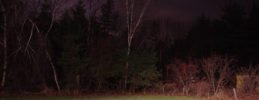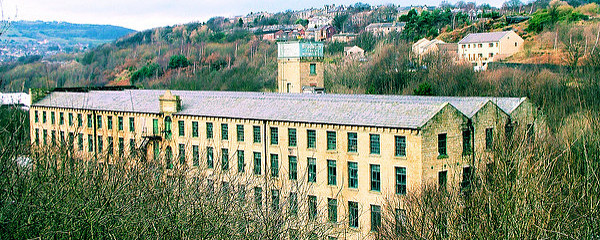
('Britannia Mills, Colne Valley' © Nuala, 2008)
PHYLLIS BENTLEY – A WOMAN OF STRONG PASSIONS
by JULIA A HICKEY
Once upon a time, at the beginning of the twentieth century, a bespectacled child dreamed of becoming a writer. The child was the offspring of middle-class parents. He was a master dyer. She was the daughter of a mill owner who finished cloth. Their match might have been love but it also made sound economic sense. The child’s destination was domesticity even though as she grew older she was left sitting on the side-lines whilst her prettier classmates took to the dance floor.
Phyllis Bentley (1894-1977) turned twenty-four the week after the Armistice ending World War One was signed. In some respects, her early years had been typical of the daughter of an affluent West Riding mill owner. The youngest, and only daughter of master dyer Joseph Bentley’s four children, her world oscillated between the schoolroom and the drawing room where her rigidly Victorian and demanding mother, Eleanor, reigned supreme. Writing in 1932 for the Leeds Intelligencer, Bentley commented that she loved fireworks as a child because they weren’t subject to ‘tiresome moral laws’. It is possible in those three words to hear the bonds of etiquette that constrained Bentley’s childhood. In the short story ‘Out to Tea’, Bentley explores the unspoken protocol of little girls being required to have friends from similar social strata and the consequences of unwittingly moving out of the correct sphere. She provides descriptive detail such as listening to ‘Annotsfield genealogies, while the horsehair sofa pricked my legs’, conjuring the tedium of a respectable childhood.
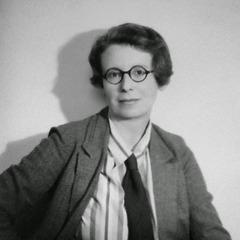 In her autobiography, O Dreams O Destinations (1962), Bentley recognised the way in which her generation changed the way women’s lives were lived. Bentley’s own independence drew a step closer when she was permitted to enrol at Cheltenham Ladies’ College in 1910 to study for an external degree from the University of London. In 1914 she received a first class pass degree. She did not qualify for an honours degree thanks to her gender. She was also expected to return to the drawing room where women only needed education if they were not pretty enough or their fathers were not wealthy enough to capture the attention of prospective suitors – a theme visited in a story entitled ‘Cruel as the Grave’ that explores the life chances of cousins Kate and Lucy.
In her autobiography, O Dreams O Destinations (1962), Bentley recognised the way in which her generation changed the way women’s lives were lived. Bentley’s own independence drew a step closer when she was permitted to enrol at Cheltenham Ladies’ College in 1910 to study for an external degree from the University of London. In 1914 she received a first class pass degree. She did not qualify for an honours degree thanks to her gender. She was also expected to return to the drawing room where women only needed education if they were not pretty enough or their fathers were not wealthy enough to capture the attention of prospective suitors – a theme visited in a story entitled ‘Cruel as the Grave’ that explores the life chances of cousins Kate and Lucy.
But the world was changing, and in 1915 Bentley went to North London to take up a teaching job in a boys’ grammar school. Six months of misery followed because she was unable to maintain discipline. Defeated, she returned home to the ‘great bocks of dingy mills’, ‘the steep, narrow, dirty streets’, and ‘yarn tops whose coils looks so nice and white but are so greasy to the touch’. She would spend her writing career bringing those scenes and the people who populated them to life. The key difference between Bentley and her classmates at Princess Mary High School for Girls in Halifax which she’d attended as a child was that Bentley knew that her dream of becoming a writer was not such a far-fetched one – the Brontes, from nearby Haworth, were her role models. What she hadn’t yet realised was that the very place she yearned to escape from was at the heart of her authorial voice.
For the rest of the war Bentley did an assortment of jobs including working in a welfare clinic in Halifax and as a munitions clerk in London. These jobs, as much as her formal education, shaped her writing. Life brought her closer to working men and women, who she came to love for their ‘mixture of bluntness and reserve’. Increasingly, she wanted to tell their stories and speak out on their behalf – though not on the political stage, which, aside from becoming a confirmed individualist, she was far too shy to inhabit. Her novels and short stories gave voice to the ordinary and discussed the conflict that comes from change whether due to family, feeling, education, industrial process or immigration. Her exploration of those changes would be something that occupied the rest of her life.
In November 1918, though, Bentley felt herself to be surplus to requirements. Now that the war was over the message was that women in the workplace took jobs from men. There was also the problem of a shortage of likely mates – the men of Bentley’s generation having been slaughtered in Flanders. Bentley, trapped in the family drawing room in Halifax, escaped into writing. Her first collection of stories entitled The World’s Bane was published the same year. She met the cost of publication. Only one hundred and thirteen of the seven hundred and ninety copies were sold. But Bentley did not give up. In 1922 a novel, Environment, followed. She wrote six more novels to mixed reviews before her best-selling novel, Inheritance, was published in 1932. With the exception of one historical novel, Freedom’s Farewell (1936) about Julius Caesar, which was written in response to her understanding of Hitler’s rise to power, all her books and stories are set in the West Riding.
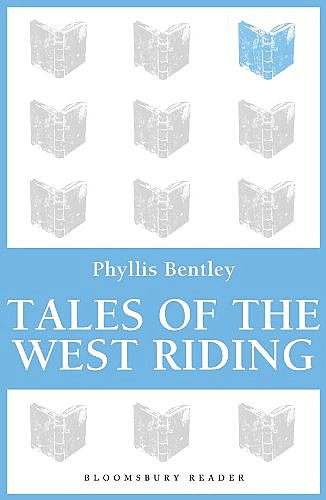 The fictional Yorkshire towns of Hudley and Annotsfield were unveiled. Their inhabitants, their trials and joys, were for her a microcosm of the wider world. The Whole of the Story (1935) and subsequent collections of short stories such as Tales of the West Riding, as well as her novels, drew their threads from the people she observed, from the history, industry and the stories of the region. Bentley described the process of writing as ‘gathering material from real life’ or what Arnold Bennet called the ‘actualness of things’. She was the kind of writer who eavesdropped on conversations.
The fictional Yorkshire towns of Hudley and Annotsfield were unveiled. Their inhabitants, their trials and joys, were for her a microcosm of the wider world. The Whole of the Story (1935) and subsequent collections of short stories such as Tales of the West Riding, as well as her novels, drew their threads from the people she observed, from the history, industry and the stories of the region. Bentley described the process of writing as ‘gathering material from real life’ or what Arnold Bennet called the ‘actualness of things’. She was the kind of writer who eavesdropped on conversations.
Bentley grew adept at slipping autobiographical fact into her fiction. Echoes of the financial ruin faced by her own family in the 1920s can be seen in a drawer of unpaid bills in the short story ‘Cruel as the Sea’. In the same story, a character dies as a consequence of impending bankruptcy. Edward Randal’s death mirrors that of Bentley’s father in 1926 when the General Strike virtually destroyed Dunkirk Mills.
What Bentley does not reveal is that by 1926 she had managed to save £700 from her writing, which she used to keep the family business afloat. From then until 1949, when Eleanor died, Bentley would support her widowed mother with whom she had a difficult relationship. She once wrote, ‘I must not grow to love her’. It is perhaps not surprising that Bentley’s stories contain more than one unflattering portrait of a self-absorbed parent.
Inheritance (1932) a tale of the tenacious mill owning, Oldroyd family, and their radical Luddite employees was published to literary acclaim. Inheritance went through nine editions in as many months and was serialised in the Daily Dispatch. Bentley had not only tackled fictionalised biography but also brought region to the fore in a way that no one had done since Thomas Hardy wrote about Wessex. Inheritance’s success culminated in 1967 with its dramatisation by Grenada: starring roles going to John Thaw and James Bolam. It could be argued that Bentley’s take on the historical regional novel ushered in modern sagas such as those by Catherine Cookson and Barbara Taylor Bradford that line the shelves of bookshops today and which sell in their millions.
During the 1930s and first half of the 1940s Bentley was feted in Britain and in America. She lectured about her own works, the art of writing and the works of the Bronte sisters. She became friends with Vera Brittain and Winifred Holtby. In 1938 she even came to the attention of the German Nazis who banned her regional novel Sleep in Peace for the views expressed in the concluding chapters.
In 1941 she published a critical work entitled The Regional Novelist. She argued that Charlotte Bronte’s Shirley was the first regional novel to be written because it could only have occurred in the landscape that had given rise to the woollen industry. For Bentley, history, geography and social realism were closely linked. Ordinariness was twisted in to the fabric of Bentley’s creativity. Even though her letters and her diaries suggest that her return to ‘gloomy Yorkshire’ was an obligation and that she found the West Riding with its grimy industrial towns ‘unspeakably dreary’, her short stories, just as her novels, are given colour and depth in the observational details of the people, habits, history and culture of the West Riding. Her works are as hefted to the rain-clad hills, moors and industrial towns of the Calder and Colne Valleys as are the sheep that graze in the hills.
In 1945, having spent the war years working for the Ministry of Information in London and New York, duty forced Bentley to lay her pen aside to care for her mother. By the time Bentley returned to her desk she had been replaced by a new wave of authors, all male, seeking social change through their own writing. The sound of Bentley’s voice faded against the backdrop of the Angry Young Men, who expressed their rage with provincial life through biting satire and parody of earlier portrayals of the North. The Oldroyds, together with the men and women who populated Bentley’s fiction had become stereotypes.
Bentley, described by the press at the height of her fame as a ‘distinguished novelist’ and in her Times obituary as ‘one of the most satisfying regional novelists of her generation’, was a prolific and now much neglected author of six volumes of short stories, twenty-one novels, assorted radio plays, newspaper articles and reviews, as well as twenty-five works of non-fiction encompassing subjects from her autobiography to volumes on public speaking and the writings of the Bronte sisters – about whom she remains expert.
Her influence on works of fiction by making the ordinary and the homely extraordinary, though largely forgotten, is an important one. Her short stories, like a warp thread running through her diverse bibliography, illustrate her talent for delineating character and location. She presents us with men and women living in close-knit families and communities, products of the places where they live and their shared histories, harbouring hidden selves as well as timeless human passions – love, lust and jealousy.
The University of Leeds recognised her talents and her influence with an honorary doctorate and fellowship. She was also a Fellow of the Royal Society of Literature. In 1970 she received an OBE. Fashions change, as do styles of writing. Not all of Bentley’s work stands the test of time but the best of it brings the West Riding to life, now, just as it did when it was freshly printed. Three of her collections of short stories are still in publication.
If her characters are microcosms of the society that Bentley observed then she herself is representative of a generation of independent-minded women who changed society’s perceptions of a woman’s role. If she is the plain but clever girl of her stories, she does not bewail her lack of suitors. Instead, she makes her life, uncompromisingly, her own and imagines a new ending to the tale of a Halifax mill-owner’s daughter. Having written candidly to Vera Brittain that she yearned for sexual experience but that she thought it unlikely, Bentley even managed a passionate love affair when respectable spinsters did not do that sort of thing. She was a best-selling novelist. She was a businesswoman; an organiser; an active and sustained participant in her community. She promoted literacy and the arts, and she was banned by the Nazis for speaking her mind. She represents a group of women who made a difference to the world in which we live. Her voice is the voice of the ordinary men and women of West Yorkshire. Her dreams resonate with any woman who imagines living outside the box of social and familial expectation.
Happen the lass did all right for herself!
~
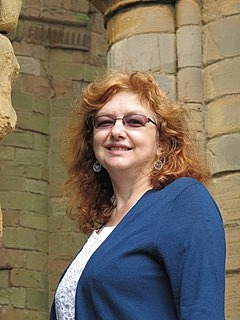
JULIA HICKEY has always loved Literature and History. She studied both at the University of Kent before going on to do a M.A. by research exploring two Victorian novelists’ response to the subject of childhood. She subsequently completed a P.G.C.E. and has taught in a range of environments from secondary school to higher education. She currently works for the Workers Educational Association across the East Midlands and Yorkshire and offers independent talks to a variety of groups. She can usually be found with a book or pen in her hand, and she blogs at thehistoryjar.com.
